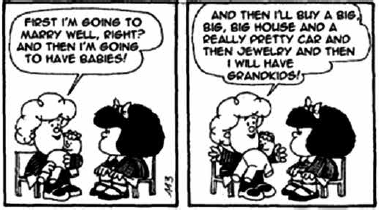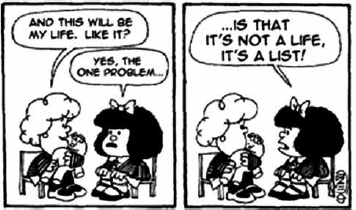Questões de Inglês - Grammar - Verb Tenses - Future with will
Read the text and answer the question.

What is the main verb tense used in the dialogue above?
Text

Considerando o contexto e a gramática da língua inglesa, as palavras que completam as lacunas na tira cômica são, respectivamente,
Leia o texto para responder à questão.
Remember the good old days, when you could have a heated-yet-enjoyable debate with your friends about things that didn’t matter that much — times when you could be a true fan of the Manchester United soccer team when you didn’t come from the city of Manchester?
How things have changed.
Now disagreements feel deadly serious. Like when your colleague pronounces that wearing a face mask in public is a threat to his liberty. Or when you see that one of your friends has just tweeted that, actually, all lives matter. Before you know it, you’re feeling angry and forming harsh new judgments about your colleagues and friends. Let’s take a collective pause and breathe: there are some ways we can all try to have more civil disagreements in this febrile age of culture wars.
1. ‘Coupling’ and ‘decoupling’
The first is to consider how inclined people are to ‘couple’ or ‘decouple’ topics involving wider political and social factors. Swedish data analyst John Nerst has used the terms to describe the contrasting ways in which people approach contentious issues. Those of us more inclined to ‘couple’ see them as inextricably related to a broader matrix of factors, whereas those more predisposed to ‘decouple’ prefer to consider an issue in isolation. To take a crude example, a decoupler might consider in isolation the question of whether a vaccine provides a degree of immunity to a virus; a coupler, by contrast, would immediately see the issue as inextricably entangled in a mesh of factors, such as pharmaceutical industry power and parental choice.
2. ___________________
Most of us are deeply committed to our beliefs, especially concerning moral and social issues, such that when we’re presented with facts that contradict our beliefs, we often choose to dismiss those facts, rather than update our beliefs.
A study at Arizona State University, U.S., analysed more than 100,000 comments on a forum where users post their views on an issue and invite others to persuade them to change their mind. The researchers found that regardless of the kind of topic, people were more likely to change their mind when confronted with more evidence-based arguments. “Our work may suggest that while attitude change is hard-won, providing facts, statistics and citations for one’s arguments can convince people to change their minds,” they concluded.
3. Just be nicer?
Finally, it’s easier said than done, but let’s all try to be more respectful of and attentive to each other’s positions. We should do this not just for virtuous reasons, but because the more we create that kind of a climate, the more open-minded and intellectually flexible we will all be inclined to be. And then hopefully, collectively, we can start having more constructive disagreements — even in our present very difficult times.
(Christian Jarrett. www.bbc.com, 14.10.2020. Adaptado.)
No trecho do último parágrafo “we will all be inclined to be”, o termo sublinhado indica uma
PRAY FOR PEACE
– Name of the Poet not available
In the moments of the morn when the day is being born
Pray for Peace
When you’re standing at the sink with some moments
free to think
Pray for Peace
When you’re putting on your shoes and you hear the
daily news
Pray for Peace
When you dance and sing and play, let the song within
you say
Pray for Peace
When you’re watching children run laughing freely in
the sun
Pray for Peace
When you’re starting up your car, take a moment where
you are to
Pray for Peace
When you’re entering the door of an office or a store
Pray for Peace
When the checkout line is long, keep your peaceful vision
strong
Pray for Peace
When your call is put on hold, let your peaceful vision
strong
Pray for Peace
When the traffic line is slow, breathe in peace and feel it
flow
Pray for Peace
When you’re sitting by the fire and flames are leaping higher
Pray for Peace
At the ending of the day when you meditate and pray
Pray for Peace
(PRAY for peace. Available on: http://unesdoc.unesco.org/images/0015/001502/150262e.pdf Accessed on: May 10th, 2018.)
Read the sentences with the verb hold:
I. They held their breath in fear.
II. The line is engaged. Will you hold?
III. They will hold the room for us till Friday.
IV. Hold my messages while I’m at the meeting.
V. “Do you want to call back later?” “No, I’ll hold.”
(Source: http://www.macmillandictionary.com)
From the alternatives given, select the only one with sentences in which the verb hold has the same meaning as in the text.


https://www.peruforless.com/blog/cultural-vibes-mafalda-the-comic-strip-character-fromargentina/
Considering the dialogues in this strip, mainly in the first and second boxes, the use of will and going to to express future can be explained by:
Use the comic strip bellow to answer question:

The verb tenses used in the stretches “You’re right”, “I’ve got to learn to be”, “You hold the ball” and “I´ll kick it” are, respectively:
Faça seu login GRÁTIS
Minhas Estatísticas Completas
Estude o conteúdo com a Duda





